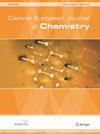Editorial preface for the special issue “Catalysis for Renewable Sources: Fuel, Energy, Chemicals”
引用次数: 1
Abstract
FOR RENEWABLE SOURCES: FUEL, ENERGY, CHEMICALS (CRS-2) was held on July 22-28, 2013 at the old university town Lund, situated in the southern Sweden. The First conference CRS-1 took place in St. Petersburg on 2010, and had a great response as an event which demonstrated a high interest to the highly actual and developing trends in science and technology. The First conference collected about 200 participants from 27 countries all over the world. Among the conference organizers were Missouri University of Science and Technology, USA and Petrobras, Brazil. The selection of CRS-2 venue was based on the intensive development of biochemical technology in Scandinavia and on the opportunity to visit the power plants, as well as the objects on production and of the biological materials, the products of fine and organic synthesis from renewable raw materials in Sweden and other neighboring countries. The Lund University was the co-organizer of the conference; the members of the Chemical Technology faculty of the University actively participated in the scientific program of the CRS-2. The conference was devoted to a discussion of the fundamental approaches to the processes of catalytic processing of plant renewable raw materials. The main objective of this discussion is the solution of the most important and especially actual problems today the complex and deep processing of vegetable raw materials to obtain valuable chemicals and fuels. The use of the renewable resources for energy can not only reduce the growth of consumption of traditional fossil fuels, but also reduce human impacts on the environment, including carbon dioxide emissions. Much attention was paid to the discussion of the pyrolysis, gasification, and fermentation technologies for the production of biofuels. The emphasis was made on catalytic methods to address these issues. CRS-2 conference was attended by about 100 participants from 28 countries. The conference program included seven plenary lectures, five keynote presentations, 38 oral and 30 poster presentations. The Plenary session was opened by a recognized expert in the field of chemical engineering from Sweden, Professor Jan Brandin (Linnaeus University). He presented an overview lecture on the current state of development of the new technologies for energy production from renewable raw materials, processes, deep processing of plant materials in Sweden. Traditionally, much attention was attracted by the lecture of one of Russia’s leading scientists in the field of biotechnology, director of the Institute of Biochemical Physics. NM Emanuel, Professor S.D. Varfolomeev. He spoke about the current approaches to the solution of technological problems waste into energy and fuels. The lecture by Professor Tapio Salmi (Åbo Akademi University, Turku, Finland) was devoted to the application of the principles of chemical engineering for low temperature biomass conversion. Interesting results was showed by Professor Jean Carlos SerranoCentral European Journal of Chemistry特刊“可再生能源的催化:燃料、能源、化学品”社论序言
2013年7月22日至28日,可再生能源:燃料、能源、化学品(CRS-2)在瑞典南部的老大学城隆德举行。第一届CRS-1会议于2010年在圣彼得堡举行,作为一个对科学技术的高度实际和发展趋势表现出高度兴趣的事件,得到了很大的反响。第一届会议聚集了来自世界27个国家的约200名与会者。会议的组织者包括美国密苏里科技大学和巴西国家石油公司。CRS-2场地的选择是基于斯堪的纳维亚生化技术的密集发展,并有机会参观发电厂,以及瑞典和其他邻国的生物材料,可再生原料精细和有机合成产品的生产和对象。隆德大学是这次会议的协办方;我校化工系教师积极参与CRS-2科研项目。会议专门讨论了植物可再生原料催化加工过程的基本方法。本次讨论的主要目的是解决当今最重要和特别实际的问题,即对蔬菜原料进行复杂的深加工,以获得有价值的化学品和燃料。利用可再生资源作为能源,不仅可以减少传统化石燃料消费的增长,还可以减少人类对环境的影响,包括二氧化碳的排放。重点讨论了生物燃料的热解、气化和发酵技术。重点讨论了解决这些问题的催化方法。来自28个国家的约100名代表出席了CRS-2会议。会议计划包括7场全体演讲、5场主题演讲、38场口头演讲和30场海报演讲。全体会议由瑞典化学工程领域公认的专家Jan Brandin教授(林奈大学)主持开幕。他就瑞典利用可再生原料、工艺、植物材料深加工生产能源的新技术的发展现状作了概述讲座。传统上,俄罗斯生物技术领域的顶尖科学家之一、生物化学物理研究所所长的演讲吸引了很多注意力。NM Emanuel, S.D. Varfolomeev教授。他谈到了目前将废物转化为能源和燃料的技术问题的解决方法。Tapio Salmi教授(Åbo芬兰图尔库学术大学)的讲座专门讨论了化学工程原理在低温生物质转化中的应用。Jean Carlos serra教授在《中欧化学杂志》上发表了有趣的研究结果
本文章由计算机程序翻译,如有差异,请以英文原文为准。
求助全文
约1分钟内获得全文
求助全文

 求助内容:
求助内容: 应助结果提醒方式:
应助结果提醒方式:


